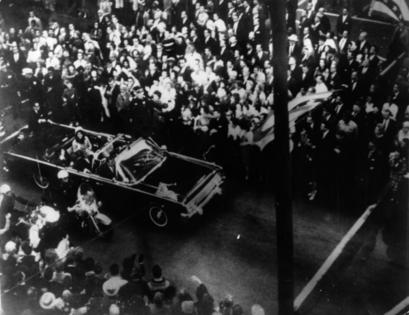Commentary: For conspiracy theorists, no defeat is final
Published in Op Eds
The recent release of the last reported bunch of classified files about the 1963 assassination of President John F. Kennedy yielded information on various mysterious CIA plans worldwide — but no agency involvement in Kennedy’s murder.
There was never any actual contact between the CIA and the assassin, Lee Harvey Oswald; no second shooter; no money trail, no phone call or paper trail; no game-changing witnesses; and no evidence of a cover-up after the shooting. The whole turn of events represents a setback, albeit temporary, to the conspiracy theory community.
Fear not, theirs is not a crusade to be abandoned lightly. The conspiracists are already gathering and frantically scouring the files, desperately searching for some unrevealed, incriminating scrap of paper the CIA neglected to destroy. The Kennedy assassination is part of the conspiracy community’s Holy Trinity — along with the death of Princess Diana, allegedly murdered with the complicity of British officials, and the 9/11 attacks, thought to be carried out with direct American involvement. Throw in the 1969 moon landing if you like to make it the fourth horseman of the apocalypse.
For conspiracy theorists, no defeat is final. There’s always more to the story, and no investigation will ever be sufficient. The release of documents, like commissions and books that fail to find a conspiracy, is simply part of larger conspiracies that are somehow capable of manipulating the findings of investigations decades later.
Ancient Greek logicians understood that to prove a negative statement, such as “there is no Santa Claus,” requires examining every possibility, no matter how ridiculous. This borders on the impossible, and because the statement “there was no conspiracy in the Kennedy assassination” involves proving a negative, this is fertile ground for conspiracists, who can never be refuted conclusively and always have an explanation to dismiss uncomfortable facts.
The only “facts” of their trade are those convenient to their theories: a grassy knoll in Dallas, where a sniper apparently avoided being seen by dozens of nearby people, managed to conceal a weapon, left no trace of escape and fired a bullet refuted by forensics. Or the ballistics of a pristine bullet, which was not pristine but minimally damaged after losing momentum by passing through the soft tissue of two people. It could be the blinding lights in a Paris tunnel and an itinerant driver’s sizable bank account or the supposed controlled demolition and physics of a pancake collapse of Twin Towers.
Inconvenient facts must be dismissed summarily, and provable alternatives must be avoided.
When supposed conspiracies involve murder, it’s helpful if the killer is killed. Consider a newly elected president, with a right-wing ideology different from his left-wing predecessor, who promises to change domestic and foreign policy, shot by a lone gunman, who, despite experienced Secret Service agents, is in unbelievably close proximity.
The gunman has a murky background, his father is a wealthy industrialist and the gunman’s stated motive is to impress a Hollywood actress. I am not referring to the assassination attempt made on Donald Trump in July but the shooting of President Ronald Reagan by John Hinckley Jr. 44 years ago, an event begging for a conspiracy.
Had Reagan died, and had the Secret Service killed Hinckley during the attempt — he must be silenced, you know — would anyone believe such a preposterous story? Surely Hinckley was a patsy! It must have been (choose one): Russians, leftists, right-wing industrialists, the CIA, the Trilateral Commission. But because Reagan and Hinckley both lived — no conspiracy. Imagine the difference for the Kennedy conspiracy if Oswald’s shots had not killed Kennedy, and Jack Ruby had not killed Oswald. But conspiracy theorists tell you it had to happen that way, that there are no coincidences.
A saying often attributed to the beat novelist William Burroughs defines paranoia as “having all the facts.” In a sense, that’s correct because there really are genuine conspiracies out there: Watergate, Iran Contra, the covert expansion of the Vietnam War, perhaps even the origin of COVID-19. For the better part of 30 years, FBI Director J. Edgar Hoover denied the existence of organized crime — an obvious conspiracy with mobsters, no less.
It’s understandable to have some distrust of authority; it used to be called the establishment, and now it is the “deep state.” But there’s a difference between a healthy distrust of authority and believing that on 9/11 a missile hit the Pentagon, not a hijacked jet whose passengers all died.
A famous apocryphal statement made by Abraham Lincoln asserts, “You can fool some of the people all of the time.” Today’s current polling data would place the figure for “some” at between 30% and 50%, a remarkably consistent figure involving Diana’s death, 9/11 and the Kennedy assassination.
Conspiracy theorists would interpret this adage by saying between 60% and 70% of the people are being fooled all the time. They might point out, correctly, that the most heinous murder of the 19th century, John Wilkes Booth’s assassination of Lincoln, was not a lone gunman acting randomly but rather the main figure in a conspiracy of assassins.
So don’t be surprised, despite the newly released files, to hear of some new Kennedy bombshell. Remember the truth is out there — but conspiracy theorists always get the final word.
____
Dr. Cory Franklin is a retired intensive care physician and the author of “The COVID Diaries 2020-2024: Anatomy of a Contagion as it Happened.”
___
©2025 Chicago Tribune. Visit at chicagotribune.com. Distributed by Tribune Content Agency, LLC.



























































Comments